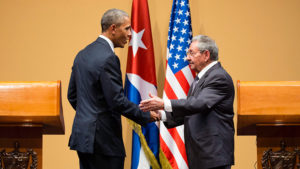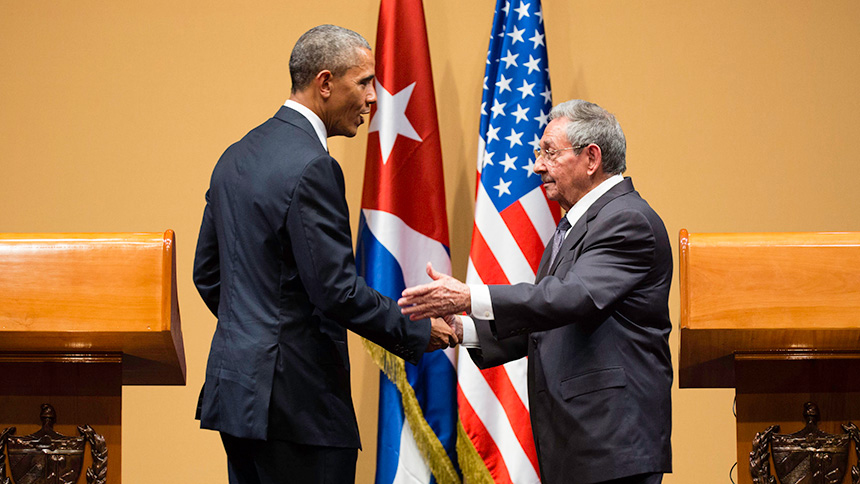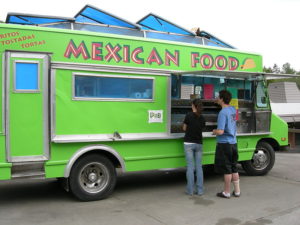One of my favorite things to do is to walk into a restaurant or up to a taco truck and order in Spanish. “Ahola!
Quesería tacos de pollo con todo y un montón de salsa!” There’s this inevitable moment of pause, followed by a slow and genuine smile and a rapid response, “When you say you want a LOT of salsa (literally translated “a mountain of salsa”), do you want it on the taco or next to the taco?” The pause is completely understandable. There’s no reason why a Yankee like me would speak Spanish, much less Mexican-accented Spanish. Except, of course, there is a reason: half my family were refugees from Cuba.
To be perfectly technical, they were refugees IN Cuba, too. As Russian Jews fleeing the Bolshevik revolution, my grandfather, great aunt and great-grandparents emigrated to Germany (couldn’t stay), France (couldn’t stay), Britain (see previous comments), but were finally taken in by Cuba after the United States rejected their application (the quota of Russians had already been filled for that year).* Cuba, at the time, didn’t quota anyone. After the US helped the new Cuban Republic get on its feet as an independent nation in 1902, Havana became an open port. There, half my family and half a million others found refuge between 1900 and 1950.
That’s why the Cuban Revolution hit everyone so hard. Cuba had been a free place. A modern place. A place of mixing of ideas and cultures. It was a fun place in that it that had plenty of rum when Florida had none. It was a rough place, too. Because it welcomed so many, it had more than its share of racism and violence. It also had a lot of social inequality and political turbulence. All of that culminated in a 1959 revolution, the intent of which was to,

People were starving and Bautista had a gold-plated telephone. It was a gift from the International Telegraph and Telephone Company (ITT), but people were understandably peeved. Photo from WikiMedia Commons.
“restore the rule of law that had been swept aside by Batista.”** The movement meant to restore democracy, freedom and respect for human rights ultimately that did worse that freeze time in Cuba. What had been “the most advanced and successful” country in Latin America started murdering and imprisoning its citizens by the tens of thousands. Equality became de-facto when the central government seized all property and set limits on earning.
My family had seen this all happen before and fled from it again, this time successfully to the US. My great aunt Eugenia lived out her days in Cincinnati, earning four PhDs, correcting my Spanish – which she often commented was, “deplorable…you sound like a poor person!” -and cursing Fidel Castro’s name. I used to think that, out of sheer will, she would outlive the man whose government chased her out of yet another beloved country. She almost made it, too. Eugenia died in 2008 at the age of 104.
Today, Fidel Castro passed away at the age of 90.
If there is a place in which we dwell after this life ends, I hope that my Aunt Eugenia is resting there in peace. Her old enemy is dead. Dead, but not defeated. What she was running from followed my family from one country to the next, then to the next. Today, the US is considering immigration laws similar to the 1920’s Quota acts that held back half my family. Those acts were put into place because, “The conditions that had made immigration essential—a need for agricultural settlers and unskilled labor—had been replaced by an increasingly urban, mechanized society. Intense nationalism, buttressed by wartime propaganda, created an atmosphere that was distrustful of everything foreign, and many things domestic.” Sound familiar? Nearly one hundred years ago, many people in this country were afraid that, “American would lose its soul.” That nativism, like our current nativism, was driven by economic factors – immigrants were the heart of labor unions, and these acts were funded by big business that hoped to crush dissent of all kinds by keeping immigrants out – as well as by personal religious beliefs, social beliefs, and fears for the future.
Though American eventually changed its mind to some extent, Cuba took that exact stance on immigration for the last 50 years. Today, there are parties in the streets. People are demanding human rights, including the right to marry, to own property, to start businesses, to run a free press, and to come and go from the country as they please.

President Obama and President of Cuba Raúl Castro at their joint press conference in Havana, Cuba, Cuba, March 21, 2016. White House photo by Chuck Kennedy.
Today, the speaker of The US House called for the Cuban people to be free. “Sadly, much work remains to secure the freedom of the Cuban people, and the United States must be fully committed to that work,” said Paul Ryan.
Based on the history of the world, of this nation, and of my own family, I contend that the best way to secure freedom is to ensure that people around the world have the right to marry, to own property, to speak freely, to come and go as they please, and to accept immigrants based upon needs (theirs and ours), not some pre-defined quota. This is why I called my reps today about HR 3009. If a city chooses to shelter immigrants – if that’s what their citizens choose to do – that’s what democracy looks like. My representative voted “no” on HR 3009 in July. The vote now goes to the Senate. Today I called my Senators McCaskill (314-367-1364) and Blunt (314-725-4484) and left messages asking them to vote as if their families were immigrants to this country, because mine was and because, with very few exceptions, all of ours were.
Now, as Cuba did in the 1950’s and will again, we need to decide what we want our country to look like: on its surface and in its soul.
————
I also called Paul Ryan’s office today at (202) 225-0600. The line was busy. So I called the House Oversight Committee (202-225-5074). That mailbox is full and cannot accept new messages.
*If you want to know more about the quota that the United States of American placed on Jews, Eastern Europeans, Asians, and others, please read about the US Emergency Quota Act of 1921 and the Immigration Act of 1917. The first limited immigration to 3% of any nationality already present in the US – meaning that Western Europeans had preference. The second act blocked immigration of from the entire Asian-Pacific Zone.
** This is according to Author Carlos Alberto Montaner, Cuban ex-pat and author. His blog is at http://www.elblogdemontaner.com/
And now…in Spanish.
Una de mis cosas favoritas para hacer es entrar en un restaurante o hasta un taco carretilla y orden en español. “Ahola! Quesería tacos de pollo con todo y un montón de salsa!”
Hay este inevitable momento de pausa, seguida por un lento y sonrisa sincera y una respuesta rápida, “Cuando usted dice que quiere un montón de salsa (traducido literalmente “una montaña de salsa”), ¿Desea que en el taco o junto al taco?” La pausa es totalmente comprensible. No hay ninguna razón para que un Yankee como yo iba a hablar español, mucho menos acentuados en español mexicano. Excepto, por supuesto, hay una razón: la mitad de mi familia son refugiados procedentes de Cuba. Para ser perfectamente técnica, estaban refugiados en Cuba, demasiado. Como los judíos rusos que huían de la revolución bolchevique, mi abuelo, tía abuela y bisabuelos emigraron a Alemania (no podía quedarse), Francia (no podía quedarse), Gran Bretaña (ver comentarios anteriores), para ser finalmente adoptadas por Cuba después de los Estados Unidos rechazaron su solicitud (la cuota de rusos ya habían sido llenados de ese año).* en Cuba, por el contrario, no arancelario a nadie. Después de los Estados Unidos ayudó a la nueva república cubana obtener sobre sus pies como una nación independiente en 1902, La Habana se convirtió en un puerto abierto. Allí, la mitad de mi familia y la mitad de un millón de personas encontraron refugio entre 1900 y 1950.
Es por eso que la Revolución Cubana hit todos tan duro. Cuba ha sido un sitio libre. Un lugar moderno. Un lugar de mezcla de ideas y culturas. Era un lugar divertido en el que que tenía un montón de ron cuando Florida no tenía ninguno. Es un lugar áspero, demasiado. Porque acogió a tantos, se había más que su cuota de racismo y violencia. También había un montón de la desigualdad social y la inestabilidad política. Todo ello culminó en una revolución de 1959, cuya intención era, “restablecer el imperio de la ley que habían sido dejados de lado por Batista.”** un movimiento destinado a garantizar la democracia, la libertad y el respeto de los derechos humanos, en definitiva, que hicieron peor que congelar el tiempo en Cuba. Lo que había sido “la más avanzada y exitosa” país en América Latina empezó asesinando y encarcelando a sus ciudadanos por las decenas de miles de personas. La igualdad se convirtió de facto cuando el gobierno central todos los bienes incautados y establecer límites para ganar.
Mi familia había visto todo esto sucederá antes y huyó de nuevo, esta vez con éxito a los Estados Unidos. Mi tía abuela Eugenia vivió sus días en Cincinnati, ganando cuatro doctorados, corregir mi español -que, a menudo, comentó, era “deplorable…Usted suena como una persona pobre!” y maldiciendo a nombre de Fidel Castro. Yo solía pensar que, de pura voluntad, ella podría sobrevivir al hombre cuyo gobierno persiguió a ella fuera de otro amado país. Ella casi lo hizo también. Eugenia murió en 2008 a la edad de 104.
Hoy en día, Fidel Castro falleció a los 90 años de edad.
Si hay un lugar en el que ella habita, espero que mi tía Eugenia está descansando en paz. En la misma ciudad donde se encontraron refugio de la persecución, hizo una casa, enseñó la High School secundaria, y luego lo abandonaron todo para encontrar la seguridad y la libertad en otros lugares, hay partes en las calles. Su viejo enemigo está muerto. Muertos, pero no, quizás, derrotado. Lo que estaba en marcha en seguida a mi familia aquí. Hoy, Estados Unidos está considerando las leyes de inmigración similar a la cuota de 1920 actos que retienen la mitad de mi familia. Esos actos se ponga en marcha, porque “las condiciones que han hecho de la inmigración esencial—una necesidad de colonos agrícolas y la mano de obra no calificada—había sido sustituido por una sociedad urbana, cada vez más mecanizada. Intenso nacionalismo, reforzada por la propaganda de guerra, crearon una atmósfera que se desconfía de todo extranjero, y muchas cosas internas.” ¿Le suena familiar? Hace casi cien años, muchas personas en este país tenían miedo de que, “American perdería su alma.” Este nativismo fue impulsada por factores económicos, los inmigrantes fueron el corazón de los sindicatos, y estos actos fueron financiados por grandes empresas que esperan para aplastar el disenso de todo tipo por mantener a los inmigrantes fuera-, así como por personal de las creencias religiosas y las creencias sociales.
Cuba tomó esa postura exacta sobre la inmigración en los últimos 50 años.
Hoy en día, hay partes en las calles. Las personas están exigiendo los derechos humanos, incluido el derecho al matrimonio, a la propiedad, para empezar negocios, para ejecutar una prensa libre, y para ir y venir del país como les plazca. Hoy, el presidente de nuestra casa, llamada por el pueblo cubano a ser libre. “Por desgracia, queda mucho trabajo por hacer para asegurar la libertad del pueblo cubano, y Estados Unidos debe estar plenamente dedicados a esa labor,” dijo Paul Ryan.
Sobre la base de la historia del mundo, de esta nación y de mi propia familia, sostengo que la mejor manera de asegurar la libertad es asegurar que las personas de todo el mundo tengan el derecho de casarse, poseer propiedad, hablar libremente y Para ir y venir como les plazca.
Es por eso que hoy llamé a mis representantes sobre la HR 3009. Si una ciudad elige refugiar a los inmigrantes -si es lo que sus ciudadanos eligen hacer-, así es la democracia, y no deberían ser castigados por ello. Mi representante votó “no” en la HR 3009 en julio. El voto ahora va al Senado. Así que llamé a mis senadores McCaskill y Blunt y les dejé mensajes pidiéndoles que votaran como si sus familias fueran inmigrantes a este país, porque la mía era. Porque, con muy pocas excepciones, todos los nuestros eran.
Y porque ahora, como lo hizo Cuba en los años cincuenta y volverá a hacerlo, tenemos que decidir lo que queremos que nuestro país parezca: en su superficie y en su alma.

